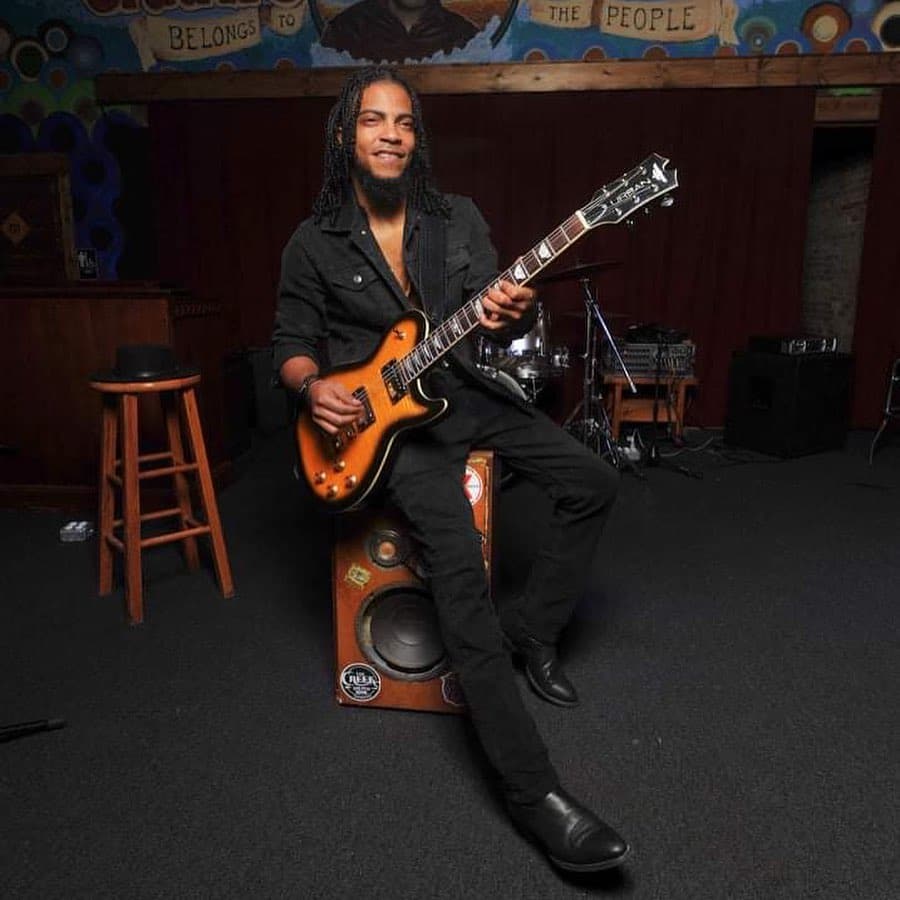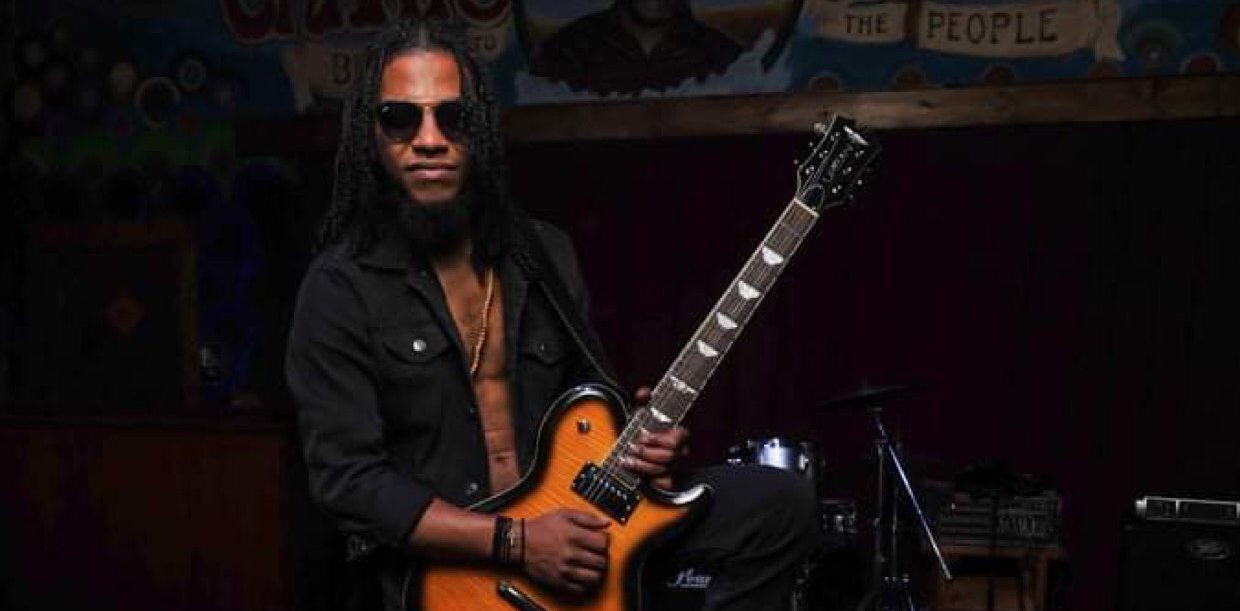In the early 20th Century, blues and gospel music began boiling to the surface from bottomless springs across the South. Blues is one of the few truly American art forms, textured with grit and often the howl of the downtrodden, while gospel emphasizes hope. Cash’s Juke Joint, a 4-piece band native to Macon, embodies the spirit of both with beauty and authenticity.
Angel “Cash” Ocasio Jr. describes the Juke Joint as, “Soul-stirring music. Period.” Cash’s only mission is to create music with “so much soul, you gonna rock with it,” an intensity shared by the rest of the outfit featuring Kennedy ”Coco” Cook, Anthony Bussey, and Javares Dunn.
I had the pleasure of talking with Cash about everything from early blues to the experiences of a musician of color trying to make a living in the 21st Century South.
MM: Are you from Macon originally?
AO: I’m actually from Nashville, Georgia.
Oh yeah, that’s just south of Irwin County, right? Basically, the middle of nowhere?
Yeah, yeah! Berrien County– you know, Ray City, Alapaha?
Hey, man I totally understand! I’m from Rochelle, Georgia.
Yeah, man, I’ve heard of that town actually. Is that Wilcox County?
Yes sir! Well, what brought to you Macon?
My senior year, my parents moved to Macon, and I was a musician, so I ultimately stayed and that’s what’s kept me hanging around. It really is for the music, man. I worked in churches for years in Warner Robins but finally moved into the city in Macon, and I just started getting in tune.
How long has Cash’s Juke Joint been around?
Gosh… I think we started in 2020?
Oh wow, that’s a heck of a year to start a band!
As crazy as it was, that is where we started, and we’ve built to where we are. It was weird, of course, booking gigs, but we made it happen and people came out and we kept doing shows. I can’t say that the pandemic actually stopped anything per se.
How did the Juke Joint come about? You said you’ve been playing since you were in Macon, so were you doing the solo thing?
Yeah, I was freelancing. I’ve been a musician all my life, but around the age of 24, I really started taking the electric guitar serious. I started putting in the work and started thinking that I wanted to start a band, and as crazy as it is, it’s all about timing. It was time in 2020. That’s when I met my singer, Coco, who moved to the area because of the military. We got to talking at Grant’s, and she was like, “Do you want to start a band?”
Who all is in the band?
My main players are Kennedy Cook, Anthony Bussey is the bassist, and Javares Dunn plays drums. That’s my main band but sometimes, I’ll have extra players with us. It just depends on the occasion.
In terms of band names, I think you might have hit on a genius one because bands often try to create a sense of community among their fans, and I feel like “Juke Joint” perfectly encapsulates that.
I’m an old soul, that’s the thing. I’m still young, but I have an old soul, and I’m from Nashville, which is right there by Willacoochie, Georgia. It’s these odd, small Georgia towns that I grew up around that had that juke joint, chitlin circuit vibe, and that’s a lot of my influence. So when I get to Macon and eventually to Grant’s… You know, especially old Grant’s was a hole-in-the-wall juke joint and that’s where I saw the idea. I decided whenever I started a band, I had to have juke joint in the name. But I’m honestly just happy the name works. It’s sometimes hard to come up with names, so we’re lucky!
Yeah, you’re right, even outside of the great potential of marketing, the term juke joint brings up a lot of super cool images of smokey clubs and the rawness of the chitlin circuit. I too am an old soul and love to get lost in the history of a place, but that can also be kind of scary in the South because some of that history can be painful.
But there is a beauty of it– and that’s what we try to present is the beauty of the juke joint. That’s what we try to capture with the energy at our shows. Kind of like when you’re here, you belong at the juke joint. We definitely get a crowd reaction. We then play off of that, and it’s all about that simple reciprocation.

How has your experience as an artist of color been as you try to make it as a full-time musician in the South?
It’s definitely something that needs to be talked about. I can really only speak to my own perspective because I am mixed. I am African American and Latino, so I see and have seen a lot. Being a different race and African American specifically is certainly different. It’s tougher to get out there. I feel like I have an advantage because I do play guitar, and there is a different market for guitar. Also, the fact that I love music period has been an advantage because I don’t hold myself to one genre which has opened doors for me. But the challenge is that I do have to prove myself a little bit more simply because I am a person of color. It usually happens in the form of Caucasian people just asking what kind of music I play and that’s why I try to post so much on my website and social media. It never fails that people are surprised and talk about how they can’t believe we play “that type of music” or, “I didn’t expect you to play the guitar!” I have to be ready and show up to every gig and be on it and that’s the challenge. I mean, if I’m honest, that’s the biggest challenge is just booking. It’s 2022 but there are still places that I can’t get booked and it’s solely because of my color. It’s not because of the music I play or how I happen to do business.
Man, I can only imagine that having to be on your toes when your in front of people, constantly, can become draining after a while.
Yeah, man, that’s the thing, but I’ve learned that I have to be the one to take color out of the situation and create a space where the only black and white is the agreement that we are here to do what we do and that’s play music. I know what we’re capable of, and much like James Brown, you have to be the one to remove the color and get down to business.
Speaking of James Brown, who are some of the influences that’ve had an impact on your music?
It’s definitely the blues. It’s hard to just start naming players, but I’m very influenced by the blues and by gospel. I play the steel because of the church I grew up in, the House of God. The same I church I grew up in, players like Robert Randolph and AJ Ghent came from as well. You’ve heard of AJ Ghent, right? There’s just so many players that come from the organization that I grew up in. So that’s where my influences come from as well. You know, it’s the Sacred Steel genre. That’s where I come from, you see. That’s really where it began for me, and it’s what lead me into other genres as well because it’s so heavily rooted in bluegrass, blues, and country, and of course, it’s the steel guitar, so there’s the Hawaiian element. Almost anything with slide! Even here in Macon, it’s just a southern rock-driven town. That’s why I was able to relate when I got here because there was already a grit to the musical soul.
In terms of American music, if there had not been the blues and gospel of the early 1900s there would arguably be no music!
Yeah, man! That’s the root of a lot of music– almost everything! Just like everything else, I guess I’m a product of some of that.
What’s really beautiful to me about the music we’re discussing is that alongside the grit that exists, there’s a sort of purity that seems to permeate all of it. It makes me think of the song “Dark Was The Night, Cold Was The Ground” where Blind Willie Johnson essentially just moans over a really sparse, raw-sounding guitar.
Ah man, yeah, come on… All I can say is it’s just the blues!
Does Cash’s Juke joint have or perform any originals?
We focus more on covers right now. We do a little bit of originals. In fact, as we speak, some originals are in the works. You know we started as a band and focused on covers just to get ourselves out there and say, “Hey we’re a band,” and that’s been working slowly. We have a certain rawness to the covers we do, but now, that has transitioned to trying to translate that same rawness to original material. At one point it was, “Hey, look, we’re a new band!” But now we’re looking at taking it to the next phase. Also, what did you say the name of that song was by Blind Willie Johnson?
I believe it’s “Dark Was The Night, Cold Was The Ground”.
Man, it’s so crazy. It’s hard not to see it, let alone study it because I really love history, and I think that’s the reason why I am influenced by who I am. I mean, that’s the reason why I am here for sure because I’m soaking in the history of it all, not only in Macon but Georgia as a whole. One of my greatest influences is James Brown. He had a rawness to everything he did, but also, if I’m going to be in a band, he embodied performing in the business aspect as well as the stage. But what’s cool is that it doesn’t stop there! I mean, look at both the Allman Brothers and Little Richard, not to mention actual living legends like ol’ Robert Lee Coleman. Just hearing stories from him is everything. At this point, the music part is already down. I am more focused on the conversations like, “How do I actually live my life out as an artist now that I know how to play guitar and the blues and what not?”
I just want to play the guitar, man. I can’t quit it, so I’m just trying to make the best of what I can do. It’s coming from a very pure place– the music is always coming from a pure place no matter what song we’re doing. I think that’s where some of that grit and rawness comes from, and that’s the energy the band brings as well, its not just me. We bounce off each other. It’s all about that synergy. Amongst the band, we talk about getting into that “flow state”, getting in the same vein, being in sync, and everyone being on the one, where if one of us moves, we all move– and when that happens it doesn’t just stick to the stage. We reciprocate the energy from the crowd too and it basically becomes a juke joint! It works because that’s our mission and goal is to make everyone in the room feel in sync and a part of the Juke Joint.
